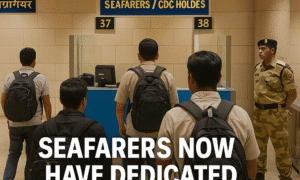Egypt—the land of pyramids, pharaohs, and timeless wonders. For many, it’s a bucket-list destination filled with history and mystery. But for seafarers calling at Egyptian ports, the experience is often far from the romantic images you see in travel brochures. Instead, it’s a world of corruption, bargaining, and relentless demands, where every visit feels like a delicate dance of negotiation.
Here’s what a typical call at an Egyptian port looks like for seafarers:
🛳️ The Port Experience: Where Cigarettes Speak Louder Than Words
From the moment your ship arrives, you’ll find yourself dealing with a variety of officials—each with their own expectations of “gifts.”
- The Pilot: It starts with the pilot. They won’t board your vessel without a demand for cigarettes—often 10 cartons, but after some bargaining, you might get away with 6. It’s not about safety or procedures; it’s about the unspoken rules of the port.
- Port State Control (PSC): Want a smooth inspection? Be prepared to pay $600 cash and hand over a few cartons of cigarettes. That’s the “fee” for avoiding unnecessary trouble.
- Quarantine Officers: They’re no different. Quarantine inspections become another transaction, with cigarettes and small cash gifts expected to move things along quickly.
- Customs Officials: If you thought customs would be any different, think again. Expect demands for cigarettes, chocolates, or small bribes in exchange for a hassle-free clearance. They might also hint at “extra charges” if you want to avoid unnecessary delays or issues.
- Security Guards Onboard: The guards stationed on your vessel often feel like permanent “guests.” They’ll casually ask for cigarette cartons, snacks, or small items throughout their watch.
The bottom line: Every authority figure—from pilot to PSC, quarantine, customs, and even security—views seafarers as easy targets for small bribes and cigarettes. It’s an exhausting, unspoken system that many feel powerless to change.
🛍️ The Floating Market Onboard: Businessmen and Bargains
Adding to the chaos, local businessmen often come aboard, turning your ship into a floating bazaar. They bring:
- Souvenirs: Mini pyramids, papyrus art, pharaoh statues.
- Gift Items: Jewelry, keychains, perfumes, and trinkets.
- Dry Fruits and Spices: Dates, nuts, saffron, and more—often at inflated prices.
Bargaining is essential here, too.
Don’t accept the first price—negotiate hard, as prices can often be slashed by 50% or more. If you don’t like the deal, walk away. They’ll usually follow you with a better offer.
“Please note that suppliers and technicians typically arrive late in the evening, often around 9:00 PM or 10:00 PM. In some cases, they may come as late as 11:00 PM, so please be prepared for their arrival at these hours.”
🏛️ The Pyramids Tour: Worth It, But Watch Your Wallet
Most agents offer a full-day tour package covering the Pyramids of Giza, the Egyptian Museum, and shopping.
- The typical rate is around $140 per person, which includes transport, a guide, and lunch.
- The catch? The shopping stops. These are often pre-arranged with specific shops where prices are sky-high.
- Don’t feel obligated to buy anything, and if you do, bargain hard. Prices can be negotiated down by half or more.
🚩 Final Thoughts: Be Prepared, Be Wary
Egypt is a land of contrasts. The pyramids inspire awe, the mummies spark curiosity, but the people you meet at the port often seem more interested in your wallet than in sharing their culture.
For seafarers, the key takeaway is:
- Expect demands for cigarettes and cash at every step.
- Be ready to negotiate—whether it’s for a pilot, a souvenir, or a pack of dates.
- And most importantly, enjoy the history, but keep your guard up.
Egypt’s magic is undeniable, but in the world of seafarers, it comes with a price tag.




Leave a comment